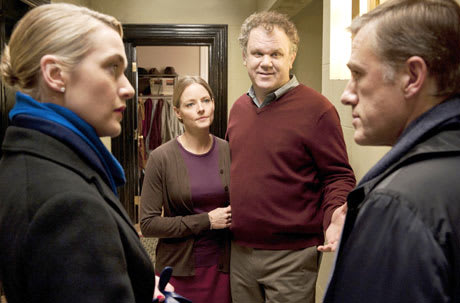Although it's set entirely in a single NYC condominium and corridor, detailing the increasingly hostile and candid discussion between two couples whose children have quarrelled in the schoolyard, Roman Polanski's film adaptation of Yasmina Reza's play, God of Carnage, is as much about framing and assemblage as it is clever verbiage and astute acting.
Polanski has once again demonstrated a keen eye for the awkward and unsettling, capturing reactions and social discomfort with an off-kilter perspective that factors in the varying emotional states and thoughts throughout a room full of four moderately polite, but passive-aggressive, adults.
Opening with a static shot of the central conflict – a boy being teased hits his oppressor in the face with a stick, knocking out two of his teeth – Carnage quickly jumps to the home of Penelope and Michael Longstreet (Jodie Foster and John C. Reilly), an affluent couple with somewhat idealistic, or worldly, liberal leanings. They've invited Nancy and Alan Cowan (Kate Winslet and Christoph Waltz) – two decidedly more conservative types, being an investment broker and lawyer, respectively – over to discuss the situation with their children.
Whether the initial act of violence can be compared to a certain terrorist attack, boiling down later discussions and blame to the core issue of human solipsism and relentless selfishness, much like the more comprehensive, but less focused Margaret, is secondary to the essential universalities at hand.
Here we have four people adhering to social customs, engaging in polite chitchat about job titles and artistic interests, consistently apologizing for and explaining any perceived slights or social faux pas. Because Polanski frames each shot from such strategic angles, revealing any minor discomforts or annoyances, smartly performed by the engrossing and dynamic ensemble, we know exactly how they feel about each other from the get-go.
What's interesting is that when everything breaks down into an ersatz state of carnage, after Nancy vomits on the coffee table and Penelope finally snaps at Alan for repeatedly taking calls on his cellphone during their meeting, nothing that anyone says is at all surprising. It's all perceivable, as is the core observation that we're all born alone and die alone, and couldn't care less about anyone but ourselves regardless of feel-good human rights prattle, but is masked by etiquettes and a somewhat deluded sense of community. The gradual integration of backhanded comments and pointed slights about arbitrarily superior morality ultimately escalate tensions, seeing as the instinct for all is to point out how right they perceive themselves to be.
If slight in vision, being a film that exists in real time in a single setting, this conversation comedy about human dynamics is marked by its fierce intelligence and sagacious care to each moment and image, working on all levels as a exceptionally directed, well acted and smartly written effort that compels from beginning to end.
(Mongrel Media)Polanski has once again demonstrated a keen eye for the awkward and unsettling, capturing reactions and social discomfort with an off-kilter perspective that factors in the varying emotional states and thoughts throughout a room full of four moderately polite, but passive-aggressive, adults.
Opening with a static shot of the central conflict – a boy being teased hits his oppressor in the face with a stick, knocking out two of his teeth – Carnage quickly jumps to the home of Penelope and Michael Longstreet (Jodie Foster and John C. Reilly), an affluent couple with somewhat idealistic, or worldly, liberal leanings. They've invited Nancy and Alan Cowan (Kate Winslet and Christoph Waltz) – two decidedly more conservative types, being an investment broker and lawyer, respectively – over to discuss the situation with their children.
Whether the initial act of violence can be compared to a certain terrorist attack, boiling down later discussions and blame to the core issue of human solipsism and relentless selfishness, much like the more comprehensive, but less focused Margaret, is secondary to the essential universalities at hand.
Here we have four people adhering to social customs, engaging in polite chitchat about job titles and artistic interests, consistently apologizing for and explaining any perceived slights or social faux pas. Because Polanski frames each shot from such strategic angles, revealing any minor discomforts or annoyances, smartly performed by the engrossing and dynamic ensemble, we know exactly how they feel about each other from the get-go.
What's interesting is that when everything breaks down into an ersatz state of carnage, after Nancy vomits on the coffee table and Penelope finally snaps at Alan for repeatedly taking calls on his cellphone during their meeting, nothing that anyone says is at all surprising. It's all perceivable, as is the core observation that we're all born alone and die alone, and couldn't care less about anyone but ourselves regardless of feel-good human rights prattle, but is masked by etiquettes and a somewhat deluded sense of community. The gradual integration of backhanded comments and pointed slights about arbitrarily superior morality ultimately escalate tensions, seeing as the instinct for all is to point out how right they perceive themselves to be.
If slight in vision, being a film that exists in real time in a single setting, this conversation comedy about human dynamics is marked by its fierce intelligence and sagacious care to each moment and image, working on all levels as a exceptionally directed, well acted and smartly written effort that compels from beginning to end.




